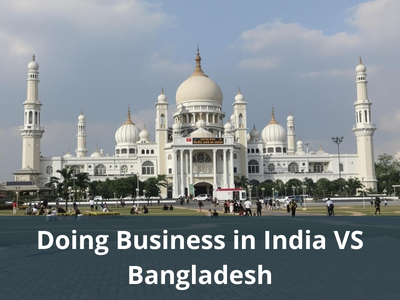Doing Business in India VS Bangladesh – A Comparison
 When deciding between India and Bangladesh as a business destination, entrepreneurs and investors often face a challenging dilemma. Both countries offer unique advantages, making the decision dependent on specific business goals and priorities. India is known for its competitive landscape, high quality of life, and cost-effective setup for small businesses, while Bangladesh offers strategic advantages in its own right, such as a growing economy and favorable labor costs.
When deciding between India and Bangladesh as a business destination, entrepreneurs and investors often face a challenging dilemma. Both countries offer unique advantages, making the decision dependent on specific business goals and priorities. India is known for its competitive landscape, high quality of life, and cost-effective setup for small businesses, while Bangladesh offers strategic advantages in its own right, such as a growing economy and favorable labor costs.
Key Comparison Points
Business Environment
- India: India boasts a stable political environment, a robust legal framework, and significant government support for businesses, especially in the manufacturing and technology sectors.
- Bangladesh: Bangladesh is experiencing rapid economic growth, but concerns about political stability and regulatory challenges remain for foreign investors.
Taxation
- India: India offers a corporate tax rate of 22% (15% for new manufacturing companies) along with various tax incentives for startups and special economic zones.
- Bangladesh: Bangladesh has a corporate tax rate of 27.5% for non-listed companies and 22.5% for publicly listed companies, with some tax benefits for export-oriented industries.
Ease of Company Incorporation
- India: India has streamlined its incorporation process through digital platforms, reducing the time and complexity for setting up a business.
- Bangladesh: Bangladesh has made improvements in its regulatory environment, but the incorporation process can still be time-consuming due to bureaucratic hurdles.
Cost of Living and Business Operations
- India: India offers competitive operational costs, affordable office spaces, and a favorable cost of living for expatriates and entrepreneurs.
- Bangladesh: Bangladesh has lower labor costs, but infrastructure and operational expenses in urban areas can be higher compared to its regional peers.
Access to Markets
- India: India is well-connected globally with strong trade agreements and access to a large domestic market of over 1.4 billion people.
- Bangladesh: Bangladesh benefits from its strategic location near major shipping routes and has preferential trade agreements with several countries.
Quick Comparison Overview
Here’s a quick overview of the key differences for easy reference:
| Factor |
India |
Bangladesh |
| Business Environment |
Stable political environment, strong legal framework |
Rapid economic growth, but regulatory challenges |
| Corporate Tax Rate |
22% (15% for new manufacturing companies) |
27.5% (non-listed), 22.5% (publicly listed) |
| Capital Gains Tax |
Varies by asset type, favorable for startups |
Applicable, with exemptions for certain industries |
| Ease of Incorporation |
Streamlined digital process |
Improving but still bureaucratic |
| Business Costs |
Affordable operational and living costs |
Low labor costs, but higher infrastructure costs |
| Market Access |
Large domestic market, strong global connectivity |
Strategic location, preferential trade agreements |

Benefits of Choosing 3E Accounting
When navigating the complexities of doing business in India or Bangladesh, partnering with a reliable corporate service provider like 3E Accounting can make all the difference. With expertise in starting a business in India, a step-by-step guide to India company registration, and India company incorporation, 3E Accounting ensures a seamless setup process tailored to your needs. For company setup or any other assistance, feel free to contact us. Choose 3E Accounting for a hassle-free experience and focus on growing your business with confidence.
Ready to Expand into India? Choose 3E Accounting Today!
Stay Secure, Stay Successful With 3E Accounting Services
Contact Us Now
Frequently Asked Questions
India offers a stable political environment, a robust legal framework, and significant government support for businesses, especially in manufacturing and technology sectors. For detailed guidance, refer to our starting a business in India guide.
India provides a competitive corporate tax rate of 22% (15% for new manufacturing companies), while Bangladesh has a rate of 27.5% for non-listed companies and 22.5% for publicly listed companies.
India has streamlined its company registration process through digital platforms. Check out our India company registration guide for more information.
Both countries have cost advantages. India offers affordable operational and living costs, while Bangladesh provides lower labor costs but higher infrastructure expenses.
India company incorporation offers access to a large domestic market, strong global connectivity, and streamlined digital processes. Learn more about India company incorporation here.
Abigail Yu oversees executive leadership at 3E Accounting Group, leading operations, IT solutions, public relations, and digital marketing to drive business success. She holds an honors degree in Communication and New Media from the National University of Singapore and is highly skilled in crisis management, financial communication, and corporate communications.


 When deciding between India and Bangladesh as a business destination, entrepreneurs and investors often face a challenging dilemma. Both countries offer unique advantages, making the decision dependent on specific business goals and priorities. India is known for its competitive landscape, high quality of life, and cost-effective setup for small businesses, while
When deciding between India and Bangladesh as a business destination, entrepreneurs and investors often face a challenging dilemma. Both countries offer unique advantages, making the decision dependent on specific business goals and priorities. India is known for its competitive landscape, high quality of life, and cost-effective setup for small businesses, while 
